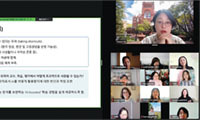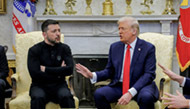The Summit of Two Korean Leaders: A Long Overdue Housecleaning
The two leaders are set to begin, during their three-day session, June 12 through 14, scouring age-old mess dumped there by outsiders with little resistance from Koreans.
The outsiders-Japanese, Americans and Russians- eager to satisfy their greed, found Koreans easy prey in pursuing their power game. The fruits of their manipulation turned out to be "Colonialization of Korea" and "The 38th Parallel."
It is heartening that, at long last, Koreans themselves are going to try to clean up and this time outsiders are standing by as spectators. What had appeared like a mission impossble no longer seems that way.
It is comforting, too, that the two governments have reached the point where they have come to realize the necessity of a dialogue. Economically and politically South Koreans are no longer poor, isolated and powerless as they used to be 50 or100 years ago, when they didn’t have a say about tragic decisions which the superpowers imposed on them.
At the turn of the 20th century Japan pursued its colonialization scheme in secret negotiations with the United States. After World War II, the United States and Soviet Union divided the Korean peninsula in half along the 38th parallel in a hasty, convenient way to disarm the Japanese troops in Korea.
Japan’s move to colonialize Korea began when the so-called Taft-Katsura Treaty was sealed in July 1905. This agreement essentially turned Korea over to Japan. The division of the peninsula, the Korean War and bitter animosities between the two governments for half a century ensued.
Finally, Koreans have come a full circle in attempting to untangle the shameful knots.
Main forces that brought the two leaders to a negotiating table are the South’s economic growth and the North’s prolonged famine. Like West Germany, South Korea became an economic powerhouse that can afford to offer aid to North Korea.
But without changes in attitudes on both sides, the present move could not have happened.
I know little about how North Koreans have changed. But South Koreans’ perception of their northern compatriots is remarkably different from what I saw 30 years ago. South Koreans have become generous toward the people who are suffering hardships. According to the South Korean press, they are respectful of North Koreans and are careful when mentioning their economic plight. Condescending tones prevalent in the past commentaries have disappeared.
And yet, it’s still uneasy that the job to be tackled by the two leaders will once again determine the next chapter of Korean history.
The success of the monumental task depends on the right frame of mind of the two leaders and their advisors. Their focus should be on the interests of their people not their political agendas.
They must remember that a handful of superpower leaders sealed the fate of Koreans with no thought to their welfare. Similarly, what the two Kims must keep in mind is that their decisions could have a lasting impact on the generations to come.
스마터리빙
more [ 건강]
[ 건강]이제 혈관 건강도 챙기자!
[현대해운]우리 눈에 보이지 않기 때문에 혈관 건강을 챙기는 것은 결코 쉽지 않은데요. 여러분은 혈관 건강을 유지하기 위해 어떤 노력을 하시나요?
 [ 건강]
[ 건강]내 몸이 건강해지는 과일궁합
 [ 라이프]
[ 라이프]벌레야 물럿거라! 천연 해충제 만들기
 [ 건강]
[ 건강]혈압 낮추는데 좋은 식품
[현대해운]혈관 건강은 주로 노화가 진행되면서 지켜야 할 문제라고 인식되어 왔습니다. 최근 생활 패턴과 식생활의 변화로 혈관의 노화 진행이 빨라지고
사람·사람들
more많이 본 기사
- 한화 “필리조선소서 미군 핵잠 건조하기 위한 준비 착수”
- 남가주 전역에 ‘물폭탄’… 성탄 연휴 ‘대혼란’
- 백악관, 군에 “베네수엘라 원유 격리하라” 총력 지시
- 트럼프, 李대통령에 ‘백악관 황금열쇠’ 선물… “최고의 협력관계”
- 한인타운 한복판 주유소서 강도 ‘칼부림’
- 여성 살해·자녀 납치 한인 ‘수배’
- 서태지, 딸·엘리와 1년 만에 근황 “좋은 소식 없어 안타까워”
- 체포 불체자 수만명 물류창고에 수감 추진
- ‘라스베가스에서 만난 한인들’
- “소변 불편한데 주저하다 방광 망가져”
- [2025년 한 해 ‘진 별’들] 미주 한인사회 원로들 ‘역사의 뒤안길’로
- 최준희, 엄마 故최진실 생일 맞아 추억 “우리 마미 축하”
- 중산층이 집을 사지 않는다?… 챗GPT가 내다본 주택시장 미래
- 北 “신형장거리대공미사일 동해상 시험발사”…김정은 참관
- 로비 단서 혹은 과대포장?…3천쪽 통일교 내부문건 살펴보니
- 오헌, 샌디에고 떠나 피츠버그와 입단 합의… 송성문에겐 기회
- 선우용여 “아들, 돈 없어 개밥 먹기도..아파트 마련해줬다”
- 바야흐로 ‘귀금속 시대’… 금·은·구리까지 사상 최고
- 지민의 크리스마스 선물, 친필 트리 그림과 귀여움 폭발 셀카…새 인스타 단장
- 원·달러 환율, 당국 개입에 42원 폭락
- [스티브 강 ‘인사이드 미국’] 2026 중간선거: 트럼프 지지율 하락이 말해주는 것
- 최강팀 OKC 천적으로 떠오른 샌안토니오… 4패 중 2패 안겨
- 피클볼이 바꾸는 부동산의 얼굴
- [만화경] 해수부 부산시대
- [유혜미 칼럼] 치솟는 환율, 경제 지표의 역설
- 북한인, 아마존 위장취업 대거 적발
- 팔레스타인서 구금된 한인 여성 무사 귀환
- [기고] 안정의 기준은 어떻게 제도가 되었나
- [윌셔에서] 우리 안의 ‘생각하는 사람’을 깨울 시간
- [송년 행사] LA 코리아타운 라이온스클럽
- 2026년 ‘올해의 컬러’ 전격 공개… 팬톤의 파격적 선택도 포함
- [송년 행사] 한미동맹연합회
- 테슬라, “비상사태 시 차문 안 열려”
- 쿡, 나이키 주식 매입 2005년부터 사외이사
- 서유리, ♥법조계 남친 데이트 신청에 두근.. “돈은 내가 낸다”
- [송년 행사] LA 북부한인회
- 뚜레쥬르, 뉴욕시 맨해튼 매장 오픈
- [성탄절 앞둔 우울한 경제상황] ‘내 코가 석자’… 기부 급감
- 4유닛은 ‘집’이고, 5유닛부터는 ‘사업’이다
- 미·중 무역전쟁 휴전 지속… 반도체 관세도 보류
- [성탄절 앞둔 우울한 경제상황] 연말 선물로 중고품 급증
- 첫 드라이브 스루 매장 BBQ, 뉴저지에 첫 개장
- 담합의 독과점법 위반 AB 325
- 한글학교 온라인 교사연수 성료
- [왈가 왈부] 내란재판부·정통망법 또 수정… 졸속·땜질 아닌가요
- 연말연시, 집 을 생각하다
- 조지아 역주행 사고, 한인 남편 이어 임신 아내·태아 사망
- 미 조선업 부활 위한 한·미 ‘마스가’ 프로젝트 본격
- 트럼프, GDP 호조에도 “금리 내려야” 압박
- 내년 회사채 사상 최대 2조2,500억달러 규모
1/5지식톡

-
 미 육군 사관학교 West Poin…
0
미 육군 사관학교 West Poin…
0https://youtu.be/SxD8cEhNV6Q연락처:wpkapca@gmail.comJohn Choi: 714-716-6414West Point 합격증을 받으셨나요?미 육군사관학교 West Point 학부모 모…
-
 ☝️해외에서도 가능한 한국어 선생님…
0
☝️해외에서도 가능한 한국어 선생님…
0이 영상 하나면 충분합니다!♥️상담신청문의♥️☝️ 문의 폭주로 '선착순 상담'만 진행합니다.☎️ : 02-6213-9094✨카카오톡ID : @GOODEDU77 (@골뱅이 꼭 붙여주셔야합니다…
-
 테슬라 자동차 시트커버 장착
0
테슬라 자동차 시트커버 장착
0테슬라 시트커버, 사놓고 아직 못 씌우셨죠?장착이 생각보다 쉽지 않습니다.20년 경력 전문가에게 맡기세요 — 깔끔하고 딱 맞게 장착해드립니다!장착비용:앞좌석: $40뒷좌석: $60앞·뒷좌석 …
-
 식당용 부탄가스
0
식당용 부탄가스
0식당용 부탄가스 홀세일 합니다 로스앤젤레스 다운타운 픽업 가능 안녕 하세요?강아지 & 고양이 모든 애완동물 / 반려동물 식품 & 모든 애완동물/반려동물 관련 제품들 전문적으로 홀세일/취급하는 회사 입니다 100% …
-
 ACSL 국제 컴퓨터 과학 대회, …
0
ACSL 국제 컴퓨터 과학 대회, …
0웹사이트 : www.eduspot.co.kr 카카오톡 상담하기 : https://pf.kakao.com/_BEQWxb블로그 : https://blog.naver.com/eduspotmain안녕하세요, 에듀스팟입니다…
케이타운 1번가
오피니언
 스티브 강 전 한인민주당협회 회장
스티브 강 전 한인민주당협회 회장 [스티브 강 ‘인사이드 미국’] 2026 중간선거: 트럼프 지지율 하락이 말해주는 것
 김홍일 케이유니콘인베스트먼트 대표
김홍일 케이유니콘인베스트먼트 대표 [기고] 안정의 기준은 어떻게 제도가 되었나
 유혜미 한양대 경제금융대학 교수
유혜미 한양대 경제금융대학 교수 [유혜미 칼럼] 치솟는 환율, 경제 지표의 역설
 성민희 소설·수필가
성민희 소설·수필가 [윌셔에서] 우리 안의 ‘생각하는 사람’을 깨울 시간
 김정곤 / 서울경제 논설위원
김정곤 / 서울경제 논설위원 [만화경] 해수부 부산시대

[왈가 왈부] 내란재판부·정통망법 또 수정… 졸속·땜질 아닌가요
 정숙희 논설위원
정숙희 논설위원온라인쇼핑과 반품, 그리고 그 이후
 파리드 자카리아 / 워싱턴포스트 칼럼니스트 / CNN ‘GPS’ 호스트
파리드 자카리아 / 워싱턴포스트 칼럼니스트 / CNN ‘GPS’ 호스트 트럼프의 새 독트린 “미국을 다시 왜소하게”
 김동찬 시민참여센터 대표
김동찬 시민참여센터 대표 [미국은 지금] MAGA의 분열, 예견된 균열의 시작
1/3지사별 뉴스

“온 세상에 평화를⋯”
숨가쁘게 달려온 2025년을 이제 1주일 남짓 남긴 채 크리스마스 이브를 맞는다. 다사다난했던 한 해를 되돌아보며 마무리하는 연말 시즌과 크리…
H-1B비자 고임금·경력자에 우선권

‘올해는 ICE 이민자 체포 광풍의 해’
올 한해동안 버지니아와 메릴랜드, DC 등에서 연방 이민당국에 체포된 사람이 1만명이 훌쩍 넘는 것으로 조사됐다. 또 미 전국적으로는 22만명…
“ATM기 사용하기 겁나네”

연말 ‘로드레이지’ 비극… 한인 총격 피살
연말을 맞아 도로 위에서 순간적으로 벌어진 운전 중 시비가 40대 한인 가장의 총격 피살 비극으로 이어졌다. 워싱턴주 레이시 경찰국과 서스턴 …
[‘로드 레이지’ 한인 피살 현장 상세 상황] 끼어들기 시비가 비극으로… 차에서 내려 “쏴봐라” 언쟁

오늘 하루 이 창 열지 않음 닫기 





















































.png)


댓글 안에 당신의 성숙함도 담아 주세요.
'오늘의 한마디'는 기사에 대하여 자신의 생각을 말하고 남의 생각을 들으며 서로 다양한 의견을 나누는 공간입니다. 그러나 간혹 불건전한 내용을 올리시는 분들이 계셔서 건전한 인터넷문화 정착을 위해 아래와 같은 운영원칙을 적용합니다.
자체 모니터링을 통해 아래에 해당하는 내용이 포함된 댓글이 발견되면 예고없이 삭제 조치를 하겠습니다.
불건전한 댓글을 올리거나, 이름에 비속어 및 상대방의 불쾌감을 주는 단어를 사용, 유명인 또는 특정 일반인을 사칭하는 경우 이용에 대한 차단 제재를 받을 수 있습니다. 차단될 경우, 일주일간 댓글을 달수 없게 됩니다.
명예훼손, 개인정보 유출, 욕설 등 법률에 위반되는 댓글은 관계 법령에 의거 민형사상 처벌을 받을 수 있으니 이용에 주의를 부탁드립니다.
Close
x